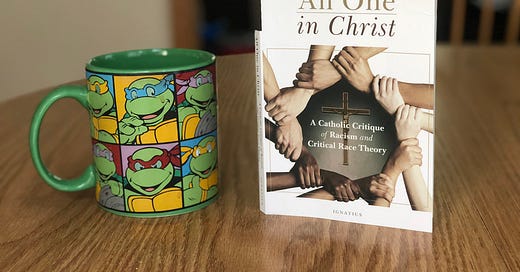Review of All One In Christ: A Catholic Critique of Racism and Critical Race Theory by Edward Feser
I just read Edward Feser’s All One In Christ: A Catholic Response to Racism and Critical Race Theory. The book is good — very good, in fact. Here’s what you can expect to get out of it.
First, Feser summarizes the Church’s stance on racism, block-quoting pronouncements up and down the centuries to highlight how the Church has always, in the strongest terms, condemned racism (understood as denying other humans basic rights because of their race). Thus, the Church requires no lessons on the matter from secular morality, says Feser.
Chapter 1 & 2 are important history for Catholics. I’m sorry — important history for everybody.
After that Feser shows how Catholics should think about rights and duties from the perspectives of traditional natural law and supernatural revelation. That is, how our basic rights are grounded both in our human nature (origin) and supernatural end (destiny), which all human beings share in common — rights which entail racism as intrinsically evil and utterly impermissible. This section will prove especially useful to anyone unfamiliar with traditional natural law. It is a lovely introduction to the topic, and demonstrates just how useful traditional natural law and Christian revelation is for securing the best of our moral intuitions, while correcting excesses like those seen in CRT.
After the Catholic position on racism is established, Feser explains what CRT is, providing ample quotations from CRT thought leaders like Ibram X. Kendi, Robin DiAngelo, and others. Here, Feser does an exemplary job highlighting just how extreme CRT ideology is while exposing the (seemingly willful) distortions used to promote or defend CRT or both, such as the claim that is it merely concerned with teaching the history of racism. As Feser’s introductory chapter to CRT proves, that claim is utterly false. CRT is a radical, revolutionary ideology, completely opposed to Catholic social teaching and sound ethical reasoning.
Feser hits hardest when exposing the philosophical problems with CRT. The entire ideology is, quite frankly, a museum of fallacies, and Feser does a brilliant job arranging the illogic for public viewing. In chapter 5, Feser scrutinizes the claims of CRT advocates, offering a brilliant lesson on elementary logic by using their examples to show how every person ought not to reason: that is, by highlighting the painfully-textbook-like examples of hominem fallacies, circular reasoning, etc., used by CRT advocates to promote their central commitments. Feser argues that CRT is a philosophical disaster, and profoundly methodologically flawed concerning its inability to make falsifiable predictions (or by constantly bringing in ad hoc explanations to save it from obvious embarrassment).
Chapter 6 continues the critique on CRT from a social scientific perspective, drawing upon the work of thinkers like Thomas Sowell, David Landes, and others. The short of this section: there is only extremely weak empirical evidence for the claims CRT advocates make (disparities = white supremacy, the existence of implicit bias, microaggressions, etc.) and extremely strong empirical evidence against them. Another important and revealing chapter.
Feser finishes by showing the strict incompatibility between CRT and Catholic social teaching.
I highly recommend this book.



